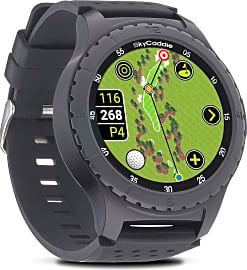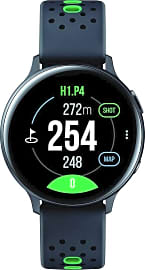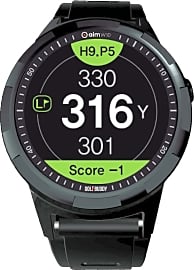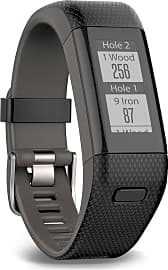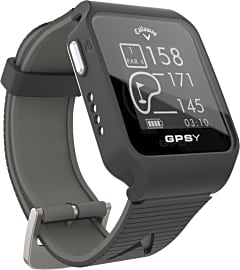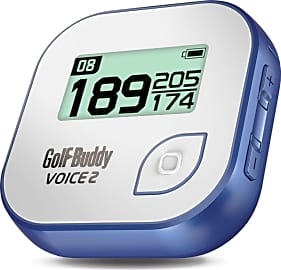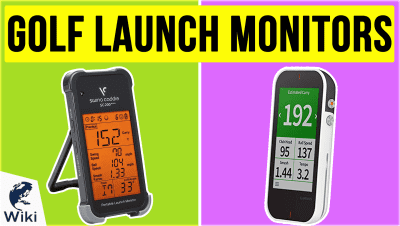The 10 Best Golf GPS Watches

This wiki has been updated 39 times since it was first published in October of 2016. If you're looking for high-tech assistance to get your handicap down, these golf GPS watches may be able to help you select the right club in a variety of situations. They display accurate yardages on tens of thousands of courses worldwide, and can provide useful warnings about hazards, too. We've ranked them here by their accuracy, user-friendliness, comfort, and battery life. When users buy our independently chosen editorial recommendations, we may earn commissions to help fund the Wiki.
Editor's Notes
July 27, 2020:
Among the product updates in this category, the Garmin Approach S62, upgraded from the S60, has quite a few improvements, even if most of them are geared toward its smartwatch features over its golf features. It includes five new sport modes, for example, that work in conjunction with its heart rate monitor to provide real-time activity feedback. It also has a slightly larger display than its predecessor, which is good for golfers and athletes alike. The SkyCaddie LX5 HD CourseView also boasts a nice big screen, and is far less expensive than the Garmin. Its course database is subscription-based, however, and even though the company provides you with three free years of use, it's an undeniable demerit.
One of the newest models out is the golf edition of the Samsung Galaxy Active2, which comes in a black and green colorway that's really attractive. It also uses AMOLED for its screen, making it one of the best choices for viewing in bright sunlight, which is a major concern on the course. Players willing to give up some of the smartwatch features you see in these high-end models might want to look at the Callaway GPSY or the Izzo Swami. They're less expensive, but they also sacrifice a lot in their interfaces, especially in visualization aids for fairway shapes and green contours. Still, if yardage is the most important detail you'd like your GPS watch to convey, they'll get the job done.
April 18, 2019:
There have been some product updates since the last time we ranked this category, as well as a few new models to come to market. Among updates, Garmin's S20, which was previously our number one pick, has been renewed as the company's S10. Why are the numbers going down? Hard to say. What is clear is that while the new model has a much higher-resolution screen that's sure to please users in the smartwatch era, it's gained that resolution at the expense of battery life, dropping from the previous model's 15 hours down to 12. That cost the new model a few spots, dropping it to number four. A totally new offering from Garmin, the X40, takes after the slimmer design of a Fitbit that should prove to be less obtrusive to your swing, which is important if you're used to shooting a round without wearing any watch at all. Some other brands have disposed of older models, like the Golf Buddy WT5, in favor of newer, sleeker designs, as well.
Special Honors
Tag Heuer Connected Players invested in the luxury side of the sport will appreciate the attention to detail that's gone into this model. Its 45mm titanium case offers a large, easy-to-read display, and its high-resolution screen can be set to show dials that resemble several of the company's iconic timepieces. It comes in an exclusive special edition box, and can record your scores to help you track your progress. tagheuer.com
Why You Need A GPS Watch For Golf
In all seriousness, though, GPS watches are extremely useful gadgets for any serious golfer.
Golf is perhaps the most perfect game ever invented, and that's not because it's more challenging than other sports or more exhilarating than most games. No, the reason why golf is perfect is because it combines three other perfect pastimes: getting out of the house, putting away unreasonable amounts of booze, and spending way too much money on electronics.
Let's face it: you don't need a GPS watch to play golf. People were playing the game long before GPS or even watches were invented, and a few of them actually turned out to be pretty good with just some clubs and God-given talent. You can absolutely take your game to the next level with just a quality set of sticks and hours of practice at the range.
But let's be honest. That's not why you want to go out and buy fancy new equipment. No, you know the real reason: it allows you to blame something other than yourself for that triple bogey. After all, you'd shoot under 80 every time if you just had the latest gizmos, right? It's the equipment's fault, I swear!
In all seriousness, though, GPS watches are extremely useful gadgets for any serious golfer. They're like having your very own Steve Williams with you on the course at all times — and Tiger was never that great without Williams by his side, was he?
So, no, a GPS watch isn't an absolute necessity. But if you're looking to take your game to the next level, they're certainly a worthy investment, and they're ideal for the traveling duffer. And hey — if your husband or wife complains about you spending more money on golf accessories, you can simply remind them how much money the watch will save you on lessons over time.
So What Does A Golf GPS Watch Do, Anway?
Just about every golf GPS watch on the market will do the same basic thing, which is tell you where exactly the pin is and how far away you happen to be at the time. They'll also show you the size and location of hazards, so you'll never again be able to say you didn't see that sand trap.
Beyond that, however, there's a wide disparity between the features that some of the top models offer.
Beyond that, however, there's a wide disparity between the features that some of the top models offer.
One feature you'll find on many watches is the ability to log and track stats. This lets you see how you stack up against the pros, so you can decide if you want to keep that day job or pursue a career making big money on the Tour (hint: you'll want to keep your day job). You can also sync this data to your smartphone, enabling you to take your stats with you to any course in the world.
Perhaps the most important stat that you can track is the amount of exercise you're getting on the links. Many of these watches have step counters, so you can see how far you had to walk looking for your ball in the rough. Additionally, you can get a calorie counter on some models, but keep in mind that it won't track how many liquid calories you ingest on the 19th hole. You'll also be able to monitor your heart rate, giving you a real-time look at just how much stress this great game is putting on your ticker.
You can also find a swing analyzer on some options, making these watches great, even if you're just hitting a couple buckets of balls at the driving range. That's one of the quickest ways to shave strokes off of your game, so you'll quickly feel unprepared any time you're on the course without your watch.
What Kind of Difference Can A Golf Watch Make for Your Game?
There's a reason why every pro leans so heavily on his caddy: the better you know the course you're on, the better your chances of shooting a great round. You won't have to rely on distance markers anymore either, so your game won't be derailed by incorrect information, nor will you slow down your foursome by looking for a sign before every shot.
So, if you can't afford a full-time caddy and on-demand swing coach, these watches will certainly come in handy on the links.
The analysis features can be worth their weight in gold for improving your skills, as well. If you're making the same mistakes on your swing without realizing it, you'll just ingrain bad habits every time you pick up a club instead of getting better. With one of these watches, however, you can make sure your body is doing everything right at all points in the swing–or be able to tell exactly where you're costing yourself some strokes.
So, if you can't afford a full-time caddy and on-demand swing coach, these watches will certainly come in handy on the links. You'll have more information at your fingertips (well, just above your fingertips) than ever before, allowing you to analyze and improve your game at every opportunity.
Of course, just having the information doesn't do you much good if you don't put it to proper use. Like any training tool, a GPS watch is only as valuable as your implementation of it — so don't blame the watch if you ignore the information it gives you and then your ball ends up in the drink.
Then again, if you don't use it properly and your game never improves, that can always justify buying a new set of clubs.


